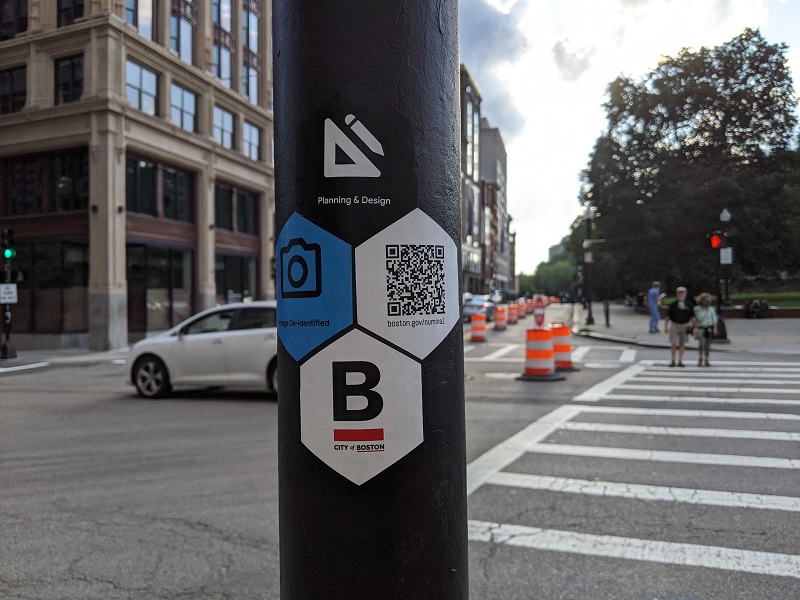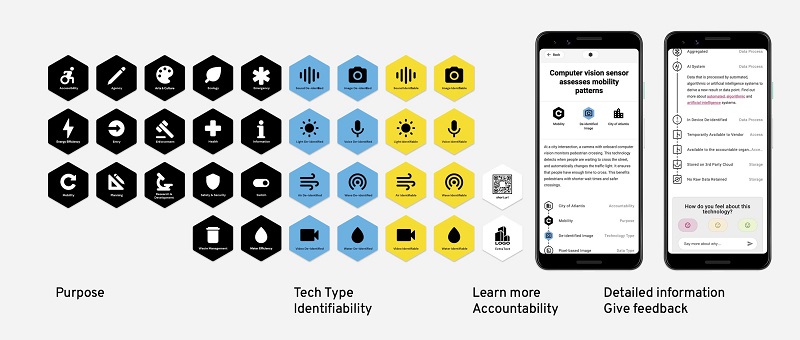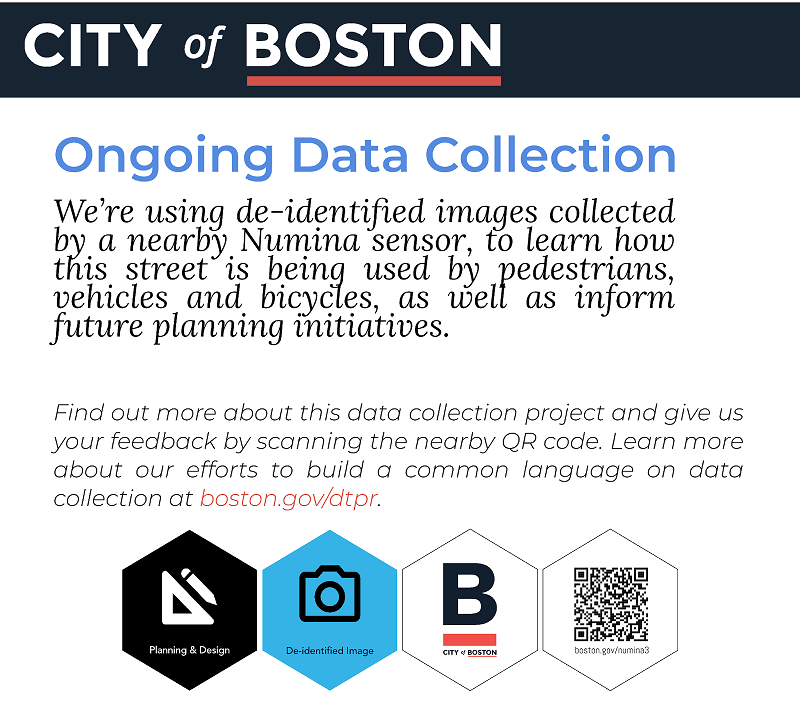
Photo: Helpful Places
Cities pilot icons to raise awareness of sensors
23 June 2022
by Sarah Wray
Four communities are piloting visual icons to provide more transparency about technology that is deployed in public spaces, such as sensors and cameras.
The initiative aims to increase trust around smart city projects and give residents a new way to provide feedback.
The Angers-Loire metropolitan region in France, the Town of Innisfil in Canada, and the City of Boston and Washington, DC in the US are testing the open source Digital Trust for Places and Routines (DTPR) communication standard.
The visual language was initiated by Sidewalk Labs in 2019 during its involvement in the since-abandoned Sidewalk Toronto project, and is now stewarded by the start-up Helpful Places. Helpful Places said the system was created through a collaborative effort that involved dozens of experts, along with testing and research with diverse groups of residents.
The signs let people know what data the technology is collecting, who’s collecting it, and what the data is being used for. By scanning a QR code on a sign, residents can learn more about the technology, ask questions, and share their feedback.

Making the invisible visible
“Visual language has been shown to help democratise complex concepts – by making invisible systems visible, the DTPR standard can help give everyone an opportunity to participate in decision-making regarding the use of technologies in public spaces,” said Jackie Lu, President and Co-Founder of Helpful Places, who formerly worked at Sidewalk Labs and was the founding Director of Data Analytics at the NYC Parks Department. “We’re excited to be working with four cities in three countries to get feedback from their residents and improve the DTPR standard.”
There is a growing push to increase transparency about city technology deployments and to make information about sensors and data more readily available.
Over the next several months, the four communities will install signage to inform and engage residents on technologies being tested in public spaces, such as sensors to monitor air quality, measure waste bin levels, and conduct traffic analysis.
Online and in-person surveys and web analytics will be used to gauge how effective the icons are. The pilots will last approximately four months.
Digital transparency
Christophe Béchu, French Minister for Local Government, President of Angers Loire Métropole, said: “Angers Loire Métropole has launched a major smart city project that will use a wide range of digital tools to improve the efficiency of its public services in order to address the major issues facing our region: energy savings, water management, waste management, transportation, etc. We want this deployment to be accompanied by a high level of transparency for citizens.
“By participating in this international experiment, Angers will contribute to the development of a democratic tool that will be essential in many cities tomorrow.”

Yo Deshpande, Technologist for the Public Realm, Mayor’s Office of New Urban Mechanics, City of Boston, commented: “The City of Boston is excited to be a part of Helpful Places’ inaugural DTPR City Cohort. This programme extends Boston’s efforts towards greater digital transparency, accountability, and engagement, while creating a new framework for partnership and sharing across cities.
“Boston is the first city in the world to deploy DTPR signage, and we’re looking forward to the next stage of DTPR as we share insights and learnings with other cities.”
Previously, some experts have noted that the symbols could be seen as an attempt to normalise potentially intrusive surveillance technology, and that notice is not the same as consent.
Sensor register
Late last year, Amsterdam launched a mandatory online register for sensors, and a recent report also called for cities to pay more attention to private sensors in public spaces.
According to Amsterdam’s online map, few non-city sensors have been registered, despite an initial deadline of June 1.
A spokesperson for the City of Amsterdam told Cities Today that the response has been mainly positive from large businesses, but some have pointed out that it will be difficult if every city has its own registry. COVID-19 has also limited registrations.
The city is now planning a publicity campaign.
If there is no response even after warnings, the municipality can remove the sensor at the owner’s expense.







